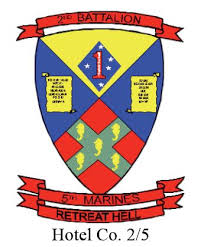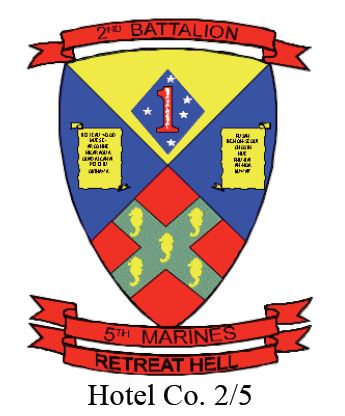 Name: Loyde YatesRank: PFCServed in Country: Jan 1968 – Mar 1968
Name: Loyde YatesRank: PFCServed in Country: Jan 1968 – Mar 1968
Awards: 2 Purple Hearts
PFC Loyde Yates arrived in Vietnam in January 1968. He was an 0331 MOS Machine Gunner. He served in Hotel 2/5 from January – March 1968. He was wounded twice during his short tour of duty. He was medivaced to Da Nang, then to Japan, and then to San Franciso, CA for rehabilitation and recovery. Below is just one of his many memories of the war he participated in.
A NIGHT IN HUE CITY – Hotel Co., 2nd Batt., 5th Marines, 1st Div.
One of my more memorable experiences during the monthlong battle for Hue City, in February 1968, was when my assistant machine-gunner, Marcus, and I were sent across the Phu Cam Canal, to the enemy’s side, part of a three-member LP (listening post). The third member was a radioman who neither of us knew. Our objective was to report any amassing of enemy troops that could storm the bridge.
We spent the night a half-block up in a dilapidated house that had endured many battles over the previous weeks. The shattered roof revealed enough light to occasionally glimpse a rat of considerable girth. (The body alone was a foot long!) It kept bumping against us, grinding its teeth and hissing. We spent the rest of the night more worried about it than the enemy who roamed about searching for the nightly LP. (That’s one reason, in our case, a machine-gun team was sent – so many other teams had not survived the night, combined with over a hundred Marines already dead and well over a thousand wounded.)
Against the odds, we made it through the night. Then, just as the sun began to peek through, there was a massive explosion. At first, because of debris hitting the structure, I thought they had spotted us, and the next round would be our last. Then the radioman received information the bridge had been blown. In our minds, that was almost as bad as being seen because either scenario could bring about the same conclusion – we were dead men waiting.
A short time later, three North Vietnamese Army (NVA) soldiers showed up in the small alley behind the house. One checked the backyard gate, changed his mind, and the three continued down the dirt path – with rifles at the ready. But a moment later, they returned, opened the gate, and entered the backyard. Despite the noise, I had no choice but to open fire, giving away our location to everyone else.
We quickly abandoned the house for adjacent buildings. The radioman received instructions from our platoon commander that rescue troops would be sent, but first, they had to check all the bridges for explosives. Meanwhile, we were to make our way towards the next bridge, a half-mile east.
In another house, a street or two over, we encountered an older man in a backroom. When he saw us, he started groaning and freaking out. Marcus grabbed him, covered his mouth, and put a bayonet to his throat. I motioned for him to wait because that also would be noisy. Besides, I wanted to give this man one last chance to live. He looked me squarely in the eyes and stopped resisting.
A moment later, a pretty Vietnamese girl, maybe 19 years old, opened a closet door. She must have seen that we spared her father’s life and figured it was safe to reveal herself. Much to my surprise, she spoke fluent English. She whispered that they were trying to make it back to their home near Highway One, which was opposite of our intended direction.
Even so, she understood our predicament and offered to help us get to the next bridge. I was hesitant to trust her, but when she said she was a student at Hue University, I knew anyone connected to the university, including students, was also high on the NVA’s kill list. That gave us the confidence we needed. More to the point, we had no better alternatives.
By midday, the five of us had made our way close to the next bridge. We came across several people in other houses during the slow and arduous journey, which was not uncommon despite the raging battles over the previous weeks. Fortunately, she knew where to hide, and if there were people inside, she talked to them before motioning for us to enter. Remarkably, nobody made any sounds on the many occasions enemy soldiers patrolled nearby.
The area around the second bridge was littered with NVA. It seemed a suicide mission to cross, but our chances of surviving were even less by not crossing.
We were saying our goodbyes to them profusely when the girl said that her father was willing to go up a ways to create a diversion. We knew that regular civilians were usually left alone (unless they could be tied to the government or the elites). Still, because more than 3000 executed bodies had already been uncovered, we declined. Besides, our side was waiting for us to cross—the plan was for troops to open fire to keep the NVA’s heads down while we hustled across.
As the father and daughter left, I told her that I hoped someday we would meet again. She gave me a beautiful smile and quickly disappeared into the rubble.
Just as we prepared to sprint from the last building before the bridge, we heard a commotion up the street. We saw several NVA soldiers running in that direction. That reinforced our decision to go for it, and the radioman signaled to them our departure.
(As a side note, we briefly discussed hiding our weapons in that building to reduce the weight we had to carry but quickly abandoned the idea. We decided since we would probably be shot on the bridge anyway, and the last thing our side needed was for the NVA to find a radio and a machine gun!)
With all of our might, the three of us went for it. We began in single file, more than six feet apart, with Marcus, who had the lightest load, going first, then the radioman, and then me. Despite our weight, the radioman and I managed to parallel Marcus in a dead heat to the finish line. With hundreds of rounds flying past our ears and marking our every step, we somehow made it! Our troops greeted us with great jubilation. As the cheers subsided, so did the firing from the other side.
Moments later, however, there were two single shots. In the pit of my stomach, I realized what must have happened.
Instead of returning to our unit, we gained permission to wait and go back across with the Marines positioned there. For the past week, It was a daily event for Hotel Company to cross the canal and engage the enemy. After dark, we would carry back our wounded and dead and wait for daylight. On this day, efforts at this bridge had only been delayed waiting to clear it of explosives, and, perhaps, waiting for our return.
Sadly, our fears were realized. Both the girl and her father lie crumpled on the main street, with single gunshots to their heads. We received permission to carry their bodies back for proper burial.
Looking back, the odds of just getting to the next bridge with the man and his daughter were extremely doubtful. They showed us the best routes and the safest places to hide. I don’t know if they deliberately distracted the enemy or were merely spotted. In terms of my guilt, I hope the latter. Either way, they put themselves at significant risk to help us, and for that, I am eternally grateful but forever saddened they gave their lives in the process.
I volunteered to go to Vietnam to fight communism. The battles did little for the Vietnamese people, but it did help contain and isolate the Soviet Union. So, I believe the sacrifices of all those who served and died were not in vain. I will always have a tender spot in my heart for the Vietnamese people and those two in particular.

